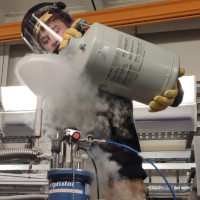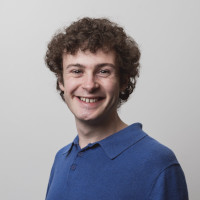James's pathway, which was featured recently in the Faraday Institution's #Faraday Pathways series, underscores the importance of exploring diverse career options and the value of pursuing a career path that excites you.
Early inspirations
James grew up in a region of South Wales known for its coal mining heritage, and his family’s connection to the industry played a significant role in shaping his career aspirations.
“Growing up, my community links to coal mining meant I always had an awareness of the impact that coal mining had. The idea that despite playing a big part in the industrial revolution we can still contribute to a green revolution is particularly inspiring to me.”
High school work experiences
 James pouring liquid nitrogen.
James pouring liquid nitrogen.
During his time at high school in Caerphilly, James had the opportunity to undertake several work experiences, which informed his ideas of what his future career might look like.
“For a while, I thought I might want to do geology, so, at the end of my GCSEs, I briefly worked for a geology company, SRK Consulting. I was analysing boreholes – looking at photos to determine where one rock type ended, and another began. They used this information to make 3D reconstructions of the ground to decide where to mine.
“I also gained experience with a highways agency, Skanska, alongside their geotechnical engineers, analysing soil to inform the likelihood of road erosion.”
While these experiences did not steer James towards pursuing geology, he highlights the value of exploring diverse career options.
“It turned out that geology wasn’t really something I saw myself doing, but I enjoy learning new things: that’s why I’m now doing a PhD. It’s important to explore different fields before deciding on a career path.”
Shaping a future in sustainability at UWC
 James Simon
James Simon
After completing his GCSE’s, James went on to study at the United World College (UWC) Robert Bosch College in Germany, where he pursued the International Baccalaureate. The college had a strong focus on sustainability, which shaped his interest in sustainable technologies.
“I applied to a UWC in Wales, but UWC matches you with the school they think fits you best. I wrote about the environment in my application essay and received a letter offering me funding from Bosch to go to the UWC in Germany, which had a focus on sustainability.
During his time at the UWC, James discovered his interest in chemistry.
“I really liked physical chemistry and sustainable materials. It just clicked for me – it felt like solving puzzles.
“It was also clear to me that studying chemistry could help me work on improving sustainability, which I found appealing. I felt that I could make a difference while learning a lot of cool stuff.”
Undergraduate years
James’ interests led him to pursue a master’s in chemistry at the University of Liverpool, where he developed an interest in energy chemistry during his second year.
“The only modules I was genuinely interested in were related to the chemistry of energy materials, batteries and solar panels. I realised I wanted to go into sustainable energy chemistry, which aligned nicely with my interest in sustainability.”
He undertook a year in industry for his third year, during which he developed systems to test corrosion rates in electric vehicles.
“During my year in industry I worked for Lubrizol, a company that manufactures lubricant additives for fluids used in vehicles. I focused on corrosion in electric vehicles: some fluids that work well in traditional engines cause major issues in electric vehicles. Using the wrong fluid in a fleet of buses, for example, would have the potential to cause conductive corrosion deposits and short circuiting.
“We developed a test to predict how long it would take for engine failure to occur, and that work was eventually published, which was quite cool.”
James furthered his investigation into sustainable energy storage through his fourth-year master’s project on redox flow battery manufacturing.
“During my project I focused on the possibility of 3D printing an entire redox flow battery system from recyclable plastics. The aim was to minimise the number of individual components made from different materials that needed to be bought and pieced together. It wasn’t a hardcore chemistry project, more about making the manufacturing technology more efficient.”
PhD research and battery safety innovations
James is now a PhD researcher working on the Faraday Institution’s SafeBatt project. He is supervised by Professor Stuart Clarke of this department, along with Professor Clare Grey and Dr Svetlana Menkin.
His work focuses on improving battery safety by determining causes of dendrite formation: metallic microstructures that can form on the negative electrode of lithium, sodium, and zinc metal batteries during the charging process. Dendrites can reduce battery performance, cause short circuiting, and, in some cases, lead to battery failure.
“Dendrites plague all sorts of battery systems, including batteries in our phones. My research uses scanning electrochemical microscopy to map surfaces and see where dendrites are likely to grow as a step towards developing strategies that prevent them forming in the first place.”
James is part of the Faraday Institution’s PhD Enrichment Scheme. He highlighted how the scheme has influenced his PhD experience.
“The Faraday Institution training has given me a broader understanding of the field. It’s easy to get caught up in the chemistry, but they’ve taught us to look at the bigger picture, like the environmental and ethical challenges in the battery industry. The networking opportunities have also been invaluable.”
Overcoming challenges and motivation in research
Like most researchers, James has faced challenges along the way but highlights how his enthusiasm for his research has kept him motivated.
“We spent a year and a half of my PhD on method development, which was challenging, but incredibly rewarding once we got it right.
“Battery research is a very dynamic and multidisciplinary field, which is really exciting. I’m fortunate to be doing something I find really enjoyable.”
James emphasised the importance of mentors and support networks.
“My current supervisors – Clare Grey, Stuart Clarke, and Svetlana Menkin – have been incredible. They all bring different strengths to the table, and I’ve learned so much from them. There are a lot of people to thank for where I am today, and I’m grateful to all of them.”
Advice and aspirations
Looking ahead, James hopes to continue working in academia.
“I enjoy doing science that I find interesting, so a postdoc position is what I’ll most likely pursue after my PhD. I have entertained the idea of going into industry, but it would have to be a position that really interests me.”
James advises early career researchers to pursue research that inspires them.
“Ultimately, science should be fun. Do what you enjoy.”
With thanks to Faraday Institution Science Communications Intern Rebecca Dawes, for kind permission to reprint this article. All photographs are courtesy of the Faraday Institution.

